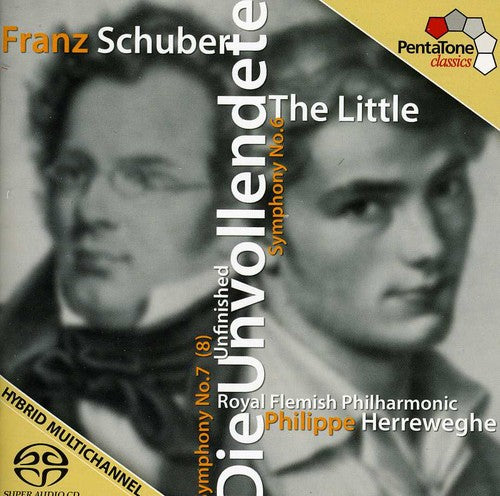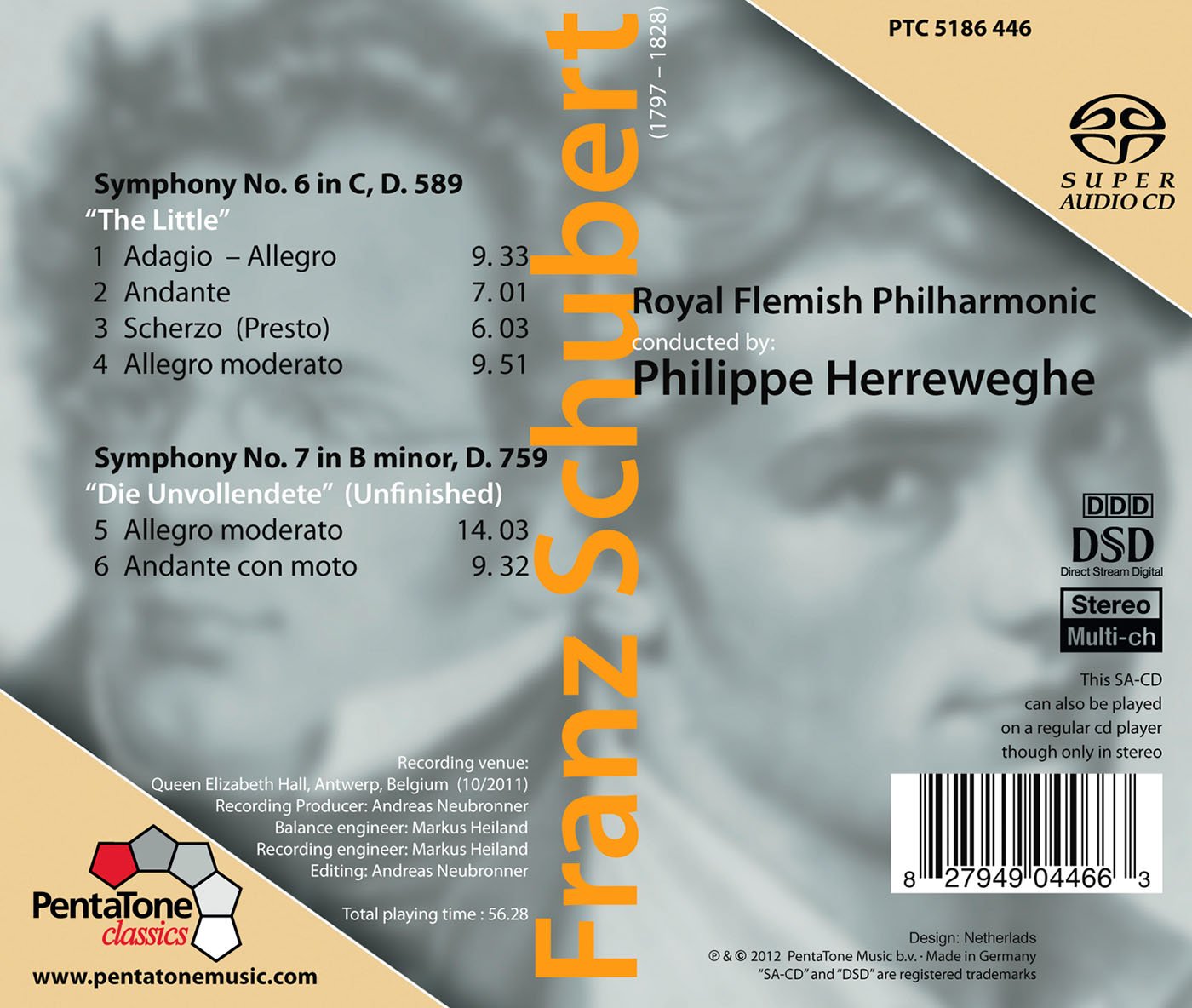1
/
of
2
Schubert: Symphonies Nos. 6 & 7 (8)
Schubert: Symphonies Nos. 6 & 7 (8)
Regular price
$21.99 USD
Regular price
$21.99 USD
Sale price
$21.99 USD
Unit price
/
per
Shipping calculated at checkout.
Couldn't load pickup availability
This is a hybrid Super Audio CD playable on both regular and Super Audio CD players.
3632680.az_SCHUBERT_Symphonies_6_C.html
SCHUBERT Symphonies: No. 6 in C, “The Little,” D 589; No. 8 in b , “The Unfinished,” D 759 • Philippe Herreweghe, cond; Royal Flemish P • PENTATONE CLASSICS 5186 446 (SACD: 56:27)
Philippe Herreweghe has long been known for his remarkable readings of everything from Josquin and Schütz through Bach and Mendelssohn to Schoenberg and Mahler. He is a true musician in his eagerness to explore, never confining himself to doing just this or just that repertoire. He brings with him a heightened sense of period-performance practice, and while that may scare some people off—those who like their Furtwängler, their Karajan, their Bernstein—in this case it shouldn’t. When, in the 1980s and 1990s, many conductors began their reassessment of which instruments were more historically appropriate, which types of limited dynamics should be used, and what kinds of articulations make the music sound more like it did in the late 18th century, many of them forgot that all of these small details do not make a great performance if there is not something else behind them: an overall conception of the music. Now that we are far enough away from the beginning of that movement and no longer concerned with only those small details, period-influenced performances are often enlightening, even when using more modern symphonic forces: Enter Philippe Herreweghe and the Royal Flemish Philharmonic.
Herreweghe certainly brings an understanding of this period’s music, having conducted very fine performances of Mozart’s Requiem and Great Mass and the complete Beethoven symphonies. His Schubert is equally remarkable. The opening of the majestic Sixth Symphony simply brims with life: the chords which seem to pop in on the scene are like thunderbolts in the opening Adagio of this performance; they are not so much heard as felt. The Allegro which follows changes the mood altogether: It is light-hearted, even in its minor-tinged moments. The intimate character of the following Andante is brought to the fore through Herreweghe’s perfectly chosen tempo and his careful balance of orchestral textures. The woodwinds truly feel as though they are commented on each other’s statements, while the strings lightly accompany them. The upbeat Scherzo leads into the more dance-like finale, the Allegro moderato . As underappreciated as this symphony is, this is as fine a performance as Herreweghe gives it. If you don’t know this symphony, this will make a perfect introduction to its charms. The far better known “Unfinished” Symphony makes a perfect pairing here: The dark hued and serious nature of this work provides a perfect foil to the sunny disposition of the former. And serious it is in this performance. Herreweghe takes the “moderate” part of the tempo marking of Allegro moderato to heart. At first the tempo seems a bit too slow (and in minor instances throughout the movement it feels the same), yet the opening’s important bass line has a sense of weight to it here which counters the beautiful major-keyed theme first played by the cellos. That later melody has less a sense of relief than reflection. One can always tell that Herreweghe uses his ear above just his knowledge and that Schubert’s message is at the forefront of these interpretations. This is top-notch Schubert in spectacularly vivid performances (hats off to the Royal Flemish Philharmonic). With SACD quality sound to boot, Schubert may have never sounded better.
FANFARE: Scott Noriega
SCHUBERT Symphonies: No. 6 in C, “The Little,” D 589; No. 8 in b , “The Unfinished,” D 759 • Philippe Herreweghe, cond; Royal Flemish P • PENTATONE CLASSICS 5186 446 (SACD: 56:27)
Philippe Herreweghe has long been known for his remarkable readings of everything from Josquin and Schütz through Bach and Mendelssohn to Schoenberg and Mahler. He is a true musician in his eagerness to explore, never confining himself to doing just this or just that repertoire. He brings with him a heightened sense of period-performance practice, and while that may scare some people off—those who like their Furtwängler, their Karajan, their Bernstein—in this case it shouldn’t. When, in the 1980s and 1990s, many conductors began their reassessment of which instruments were more historically appropriate, which types of limited dynamics should be used, and what kinds of articulations make the music sound more like it did in the late 18th century, many of them forgot that all of these small details do not make a great performance if there is not something else behind them: an overall conception of the music. Now that we are far enough away from the beginning of that movement and no longer concerned with only those small details, period-influenced performances are often enlightening, even when using more modern symphonic forces: Enter Philippe Herreweghe and the Royal Flemish Philharmonic.
Herreweghe certainly brings an understanding of this period’s music, having conducted very fine performances of Mozart’s Requiem and Great Mass and the complete Beethoven symphonies. His Schubert is equally remarkable. The opening of the majestic Sixth Symphony simply brims with life: the chords which seem to pop in on the scene are like thunderbolts in the opening Adagio of this performance; they are not so much heard as felt. The Allegro which follows changes the mood altogether: It is light-hearted, even in its minor-tinged moments. The intimate character of the following Andante is brought to the fore through Herreweghe’s perfectly chosen tempo and his careful balance of orchestral textures. The woodwinds truly feel as though they are commented on each other’s statements, while the strings lightly accompany them. The upbeat Scherzo leads into the more dance-like finale, the Allegro moderato . As underappreciated as this symphony is, this is as fine a performance as Herreweghe gives it. If you don’t know this symphony, this will make a perfect introduction to its charms. The far better known “Unfinished” Symphony makes a perfect pairing here: The dark hued and serious nature of this work provides a perfect foil to the sunny disposition of the former. And serious it is in this performance. Herreweghe takes the “moderate” part of the tempo marking of Allegro moderato to heart. At first the tempo seems a bit too slow (and in minor instances throughout the movement it feels the same), yet the opening’s important bass line has a sense of weight to it here which counters the beautiful major-keyed theme first played by the cellos. That later melody has less a sense of relief than reflection. One can always tell that Herreweghe uses his ear above just his knowledge and that Schubert’s message is at the forefront of these interpretations. This is top-notch Schubert in spectacularly vivid performances (hats off to the Royal Flemish Philharmonic). With SACD quality sound to boot, Schubert may have never sounded better.
FANFARE: Scott Noriega
Share


Product Description:
-
Release Date: August 28, 2012
-
UPC: 827949044663
-
Catalog Number: PTC5186446
-
Label: PENTATONE
-
Number of Discs: 1
-
Composer: Franz, Schubert
-
Orchestra/Ensemble: Royal Flemish Philharmonic
-
Performer: Herreweghe


